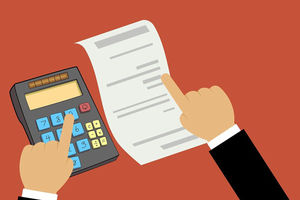Property taxes in North Carolina are relatively low compared to other states, but they are still something buyers need to account for after purchasing real estate.
Property taxes for the most part fund local government services like public education, fire & rescue departments, and law enforcement.
Understanding your property tax assessment helps you be prepared for your annual tax bill.
Here’s how you can estimate your property taxes and know exactly what you’re paying for!
How Property Tax is Calculated
The first step in calculating property tax is to assess the value of the property.
The value of your home or property is the dollar amount assigned to a home or piece of real estate.
The assessed value takes into account the value of comparable properties in the local area, among other factors.
 Finding the Assessed Value
Finding the Assessed Value
The assessed value is different from the specific value assigned to your home through a home appraisal.
In many property tax calculations, the assessed value is usually calculated as a percentage of the market value of the property.
The market value is an opinion of what a property would sell for in a competitive market based on the specific characteristics of the property, the overall market, supply and demand, and similar properties that have sold in similar conditions.
You can use our Comparative Market Analysis form to get market estimates straight from our team.
Local Tax Rates
Tax assessors factor in the local tax rate to find the assessed value of a home.
Taxes differ depending on the location of the property. That’s why it’s important to calculate your tax rate before buying North Carolina Mountain land.
Watauga County’s tax rate is for example $0.313 per $100 of property value.
Although it is helpful to look at past taxes to try and prepare for future tax bills, they do change over time.
Property tax rates fluctuate in response to changes such as home values, the size of the tax base, and local markets.
In the past five years, property tax rates in North Carolina stayed the same in 25 counties, went up in 52, and down in 23, resulting in a tax increase of about 4.8 percent on average.
Some things that may alter your property’s assessed value would be:
- the value of any recent significant (generally over $15,000) improvements
- any income you make if you are renting out a section of the property
- and the replacement cost of the property.
If you own a rental property or have recently remodeled your home, your tax rates could vary.
These are just some of the factors a tax assessor takes into consideration when calculating the assessed value of your property.
Tax Exemptions
After the value of your home is calculated, tax exemptions can be factored in.
There are a handful of exemptions for which a property owner may qualify. Residents aged 65 or older or totally and permanently disabled residents whose 2021 annual income does not exceed $31,900 are eligible for property tax exemptions.
North Carolina also allows low-income homestead exclusions for qualified individuals. Property owners that qualify must apply with the Assessor’s Office to receive low-income homestead exclusions.
With President Joe Biden’s First-Time Homebuyer Act of 2021 promising a tax credit worth up to $15,00 for first-time buyers, tax exemptions could continue to increase.
Other Factors
Market and assessed value are some of the main factors combined to determine your property tax. However, they are not the only variables property taxes are based on that can affect your bill.
The use, size, age, and type of structures on the property can all have an impact.
Whether it is commercial, residential, or agricultural is another determining factor in your final tax bill.
Can You Challenge Your Home’s Valuation?
Do you have the right to challenge your home’s valuation? The short answer is yes.
If you receive your property tax bill and feel that your property was not valued properly, there are a few steps you can take to refute the assessment. Although, sometimes this can be a lengthy and tedious process.
You can start by checking the data your local municipality has on your property. Confirm each feature about the house/property is correct and up to date, such as the size, the number of bedrooms, and all the other factors that affect your property’s value.
If you see something is incorrect, contact your local government to update the information.
Another option is to compare your tax bill with the tax bills of similar properties in the area. You can also have your property appraised by an independent professional and compare their results with the disputed assessment value.
If after all this you still feel that your property was assessed incorrectly, reach out to your local assessor’s office to request a second valuation.
Understand Property Taxes with a Real Estate Agent
Understanding property taxes can be intimidating at first but the agents at 828 Real Estate are a valuable resource to help guide you.
Reach out today if you have further questions about understanding your property taxes, and we can lead you in the right direction.


